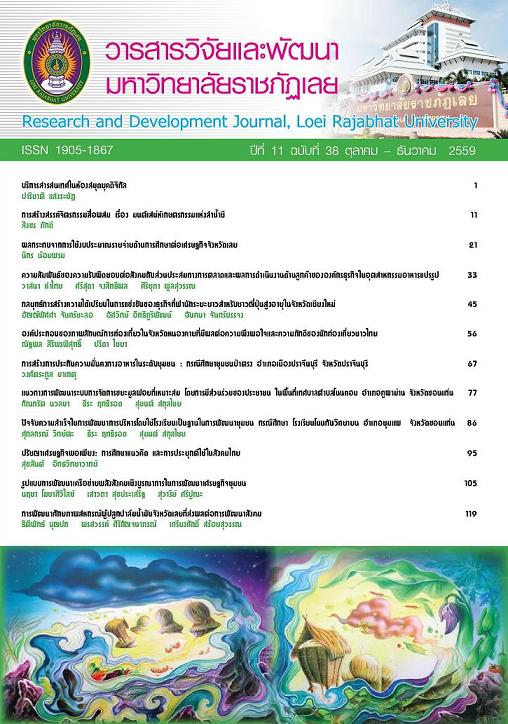ปรัชญาเศรษฐกิจพอเพียง: การศึกษาแนวคิด และการประยุกต์ใช้ในสังคมไทย
Keywords:
ปรัชญาเศรษฐกิจพอเพียง, ความรู้ความเข้าใจ, การประยุกต์ใช้, philosophy of sufficiency economy, knowledge and understanding, applicationAbstract
บทคัดย่อ
การศึกษาเรื่องนี้มีวัตถุประสงค์เพื่อสำรวจความรู้ความเข้าใจและการนำปรัชญาเศรษฐกิจพอเพียงไปประยุกต์ใช้ของบุคคลและองค์กรต่างๆ โดยแนวทางการศึกษาใช้วิธีวิจัยเชิงคุณภาพ โดยมีการสัมภาษณ์เชิงลึกบุคคลที่มีบทบาทสำคัญและมีความรู้เกี่ยวกับปรัชญาเศรษฐกิจพอเพียง ทั้งเกษตรกร นักวิชาการ นักธุรกิจ และตัวแทนหน่วยงานภาครัฐ และผู้นำชุมชนรวม 10 คน
ผลการศึกษาพบว่า ในประเด็นเรื่องความรู้ความเข้าใจผู้ให้ข้อมูลสำคัญทุกกลุ่มมีความรู้ความเข้าใจเป็นอย่างดีในหลักปรัชญาเศรษฐกิจพอเพียง และเมื่อพิจารณาแยกตามหลัก กลุ่มเกษตรกรจะให้ความสำคัญกับหลักพอประมาณ หลักอื่นจะเป็นผลพลอยได้ ขณะที่กลุ่มนักธุรกิจและนักวิชาการ จะให้ความสำคัญกับทั้งสามหลักเท่ากัน
ในส่วนของการประยุกต์ใช้พบว่า แต่ละกลุ่มก็มีการประยุกต์ใช้ต่างกันไปตามสภาพแวดล้อมและพื้นฐานอาชีพ แต่การประยุกต์ใช้ทั้งหมดตั้งอยู่บนหลักสามห่วงสองเงื่อนไขในปรัชญาเศรษฐกิจพอเพียงอย่างเคร่งครัด
สำหรับข้อเสนอแนะ เห็นควรว่า 1) ควรให้ความรู้ที่ถูกต้องผ่านสื่อสาธารณะให้เข้าใจปรัชญาเศรษฐกิจพอเพียงอย่างถูกต้องและรอบด้านมากยิ่งขึ้น 2) หน่วยงานภาครัฐต้องทำงานประสานกันโดยเน้นพื้นที่เป็นหลัก 3) ภาครัฐต้องสนับสนุนมาตรการทางการเงินให้กับเกษตรกรที่เปลี่ยนวิธีทำการเกษตร
Abstract
This qualitative study examines the knowledge, understanding and application of the Philosophy of Sufficiency Economy on the part of both individuals and organizations. In-depth interviews were conducted with ten key informants who play an important role in applying the Philosophy of Sufficiency Economy: farmers, scholars, business operators, representatives of public organizations and community leaders.
It was found that all the key informants have a good knowledge and understanding of the Philosophy of Sufficiency Economy. Farmers tend to emphasize the principle of sufficiency, whereas business operators and scholars give equal importance to all the principles. Each group has its own way of applying the philosophy, based on its social and career environment, but all of the methods of application are strictly based on the three principles and two conditions of the Philosophy of Sufficiency Economy.
Based on the findings, the following recommendations are made: 1) Correct knowledge and understanding of the Philosophy of Sufficiency Economy should be facilitated through public media; 2) Public organizations concerned with the philosophy should coordinate more and focus on the area of their responsibility; and 3) These public organizations should initiate financial measures to assist farmers during the transition to the Sufficiency Economy.
Downloads
Issue
Section
License
ข้อความที่ปรากฎในวารสารฉบับนี้เป็นความคิดเห็นของผู้เขียนแต่ละท่าน สถาบันวิจัยและพัฒนา มหาวิทยาลัยราชภัฏเลย และกองบรรณาธิการ ไม่จำเป็นต้องเห็นด้วยและไม่มีส่วนรับผิดชอบใดๆ
สถาบันวิจัยและพัฒนา มหาวิทยาลัยราชภัฏเลย ขอให้ผู้อ่านอ้างอิงในกรณีที่ท่านคัดลอกเนื้อหาบทความในวารสารฉบับนี้






